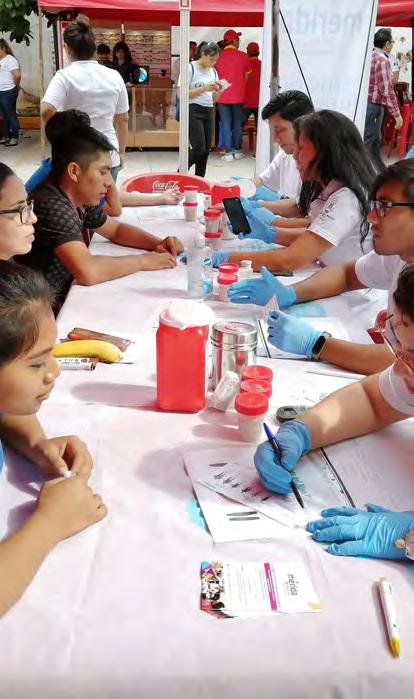
2 minute read
MÉRIDA, MEXICO
MÉRIDA MAKES SCREENING MORE ACCESSIBLE IN THE HEART OF THE CITY
Every Wednesday morning, commuters in Mérida city centre can stop to have their blood pressure, blood glucose and anthropometric (weight, height, waist) measurements taken at an ‘Attention Desk’. If high blood glucose levels are detected, the individual is invited to enrol in the Public Health Policy Municipal Centre for Nutritional Care and Diabetes (CEMANUD) diabetes education programme, Seven Steps to Control. Through this programme, participants can access workshops on healthy cooking using traditional Yucatán cuisine and educational sessions exploring the seven key behaviours required to manage diabetes.
9.2%
OF THE POPULATION IS LIVING WITH DIABETES27
EARLY DETECTION TO PREVENT TYPE 2 DIABETES
On average, the Attention Desk initiative detects 180 new cases of diabetes every month. This is important, because early detection is key to preventing diabetesrelated complications, which are already present in half of all the people diagnosed with type 2 diabetes.27 Cardiovascular disease, diabetes and chronic kidney disease are among the leading causes of death in Mexico.27,28 Exacerbating the health situation in Mexico are exceptionally high levels of overweight and obesity in the general population, and more worryingly among young people.29
CITIES CHANGING DIABETES RESEARCH IN MÉRIDA
The city of Mérida is serious about preventing non-communicable diseases. Having already established numerous diabetes-related interventions, Mérida asked to join the Cities Changing Diabetes programme in 2018, and is currently in the mapping stage of the programme. Data will be collected in two stages: the first stage will focus on establishing the prevalence of diabetes in the city, and the second will explore what makes individuals more vulnerable to diabetes in Mérida and how the disease affects those living with it.
The research protocol, which was developed in collaboration with the Autonomous University of Yucatán, sets out an ambitious programme of research that aims to establish how effective the current interventions are. It will consider not only whether the interventions are working, but also whether certain interventions – such as a Sunday cycling programme – are being offered in the parts of the city with the greatest need. By establishing where diabetes is most prevalent and exploring diabetes in relation to vulnerability, the Cities Changing Diabetes programme will be able to target interventions more effectively.
Screening event in Mérida, Mexico
IN MÉRIDA 77.9%
OF ADULTS ARE OVERWEIGHT30
50%
OF SCHOOLCHILDREN ARE OVERWEIGHT OR LIVING WITH OBESITY31
LOCAL PROGRAMME PARTNERS
Universidad Autónoma de Yucatán (Autonomous University of Yucatán)
Asociación Mexicana de diabetes del Sureste (Mexican Association of Diabetes of the Southeast)
“The key to success has been the cross-sector commitment to recognise the diabetes challenge. The involvement of specialists representing different sectors generates a multidimensional knowledge of diabetes and what it takes to address it. I believe this multidisciplinary perspective will inspire more efficient and relevant public policies and solutions going forward.”











